八下Unit 8 Have you read Treasure Island yet? 现在完成时 复习课件(共22张PPT)
文档属性
| 名称 | 八下Unit 8 Have you read Treasure Island yet? 现在完成时 复习课件(共22张PPT) |  | |
| 格式 | pptx | ||
| 文件大小 | 276.8KB | ||
| 资源类型 | 教案 | ||
| 版本资源 | 人教新目标(Go for it)版 | ||
| 科目 | 英语 | ||
| 更新时间 | 2023-06-11 16:52:15 | ||
图片预览

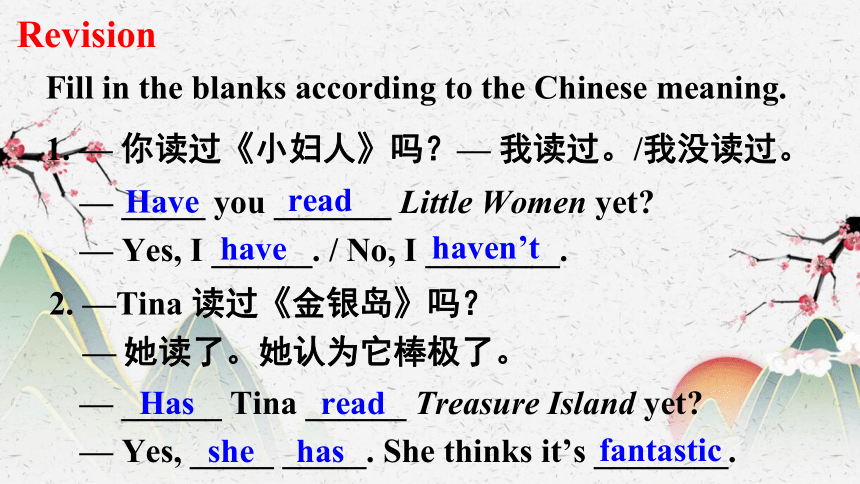
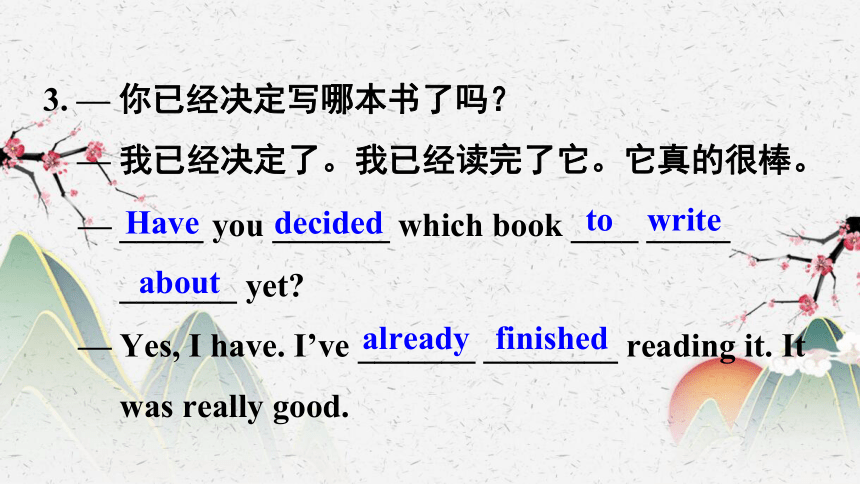
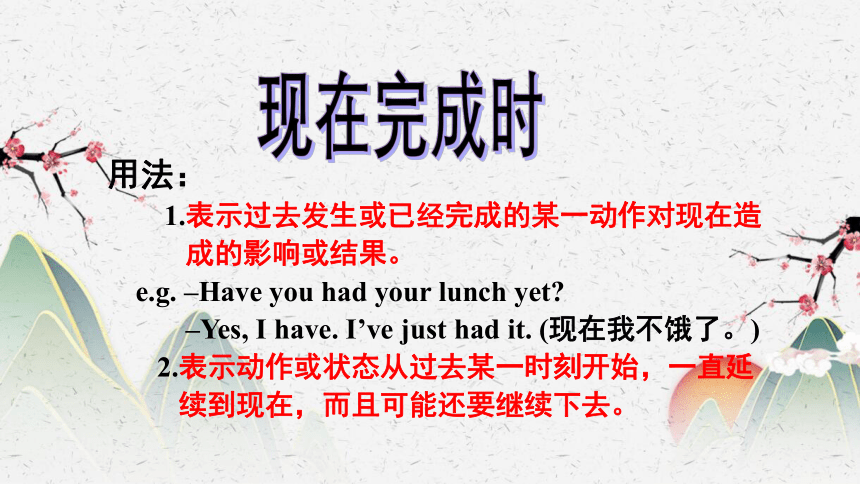
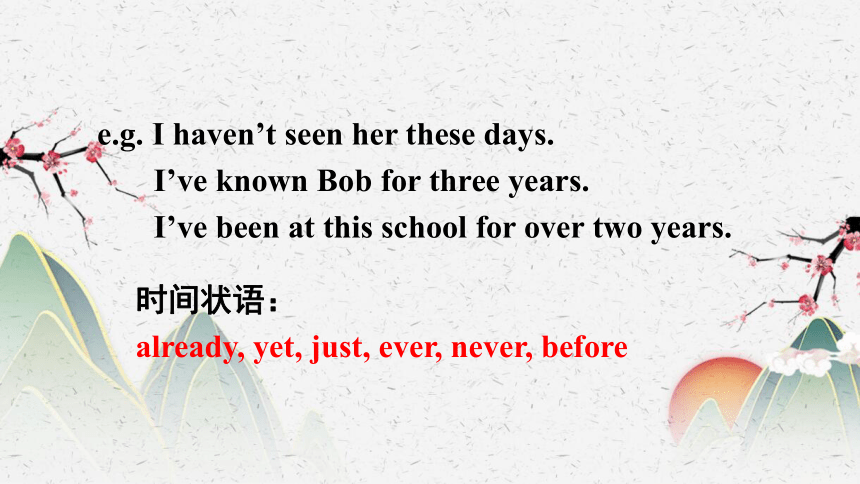
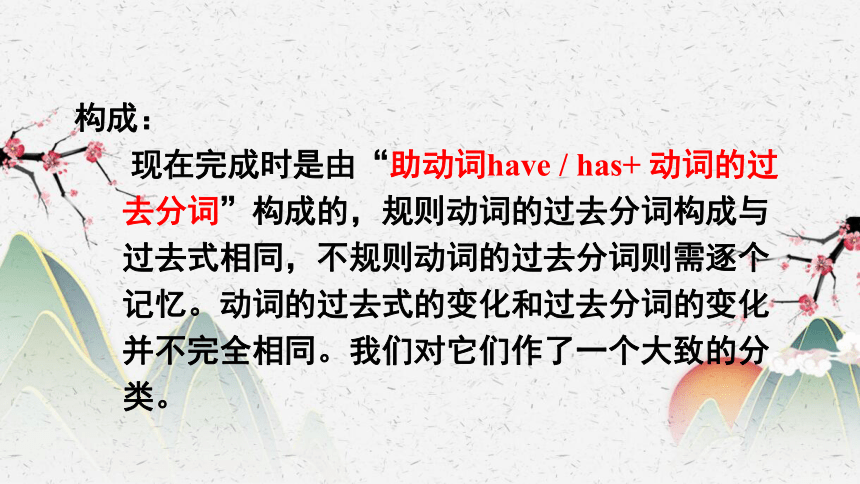
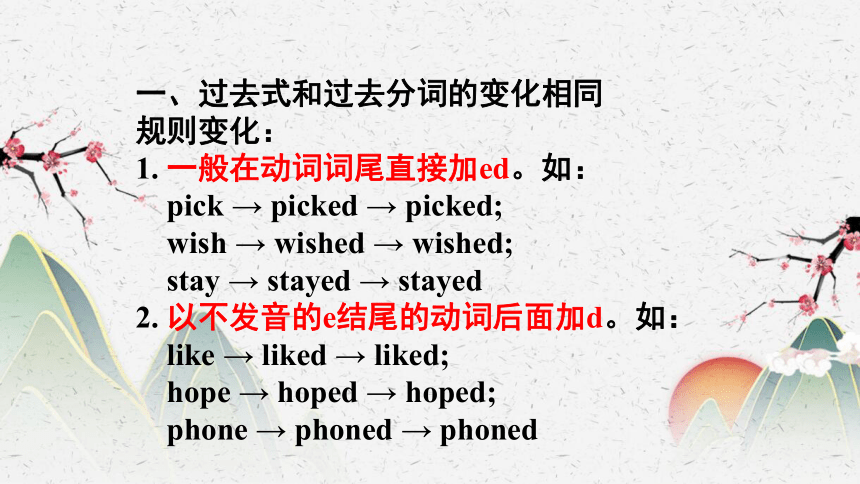
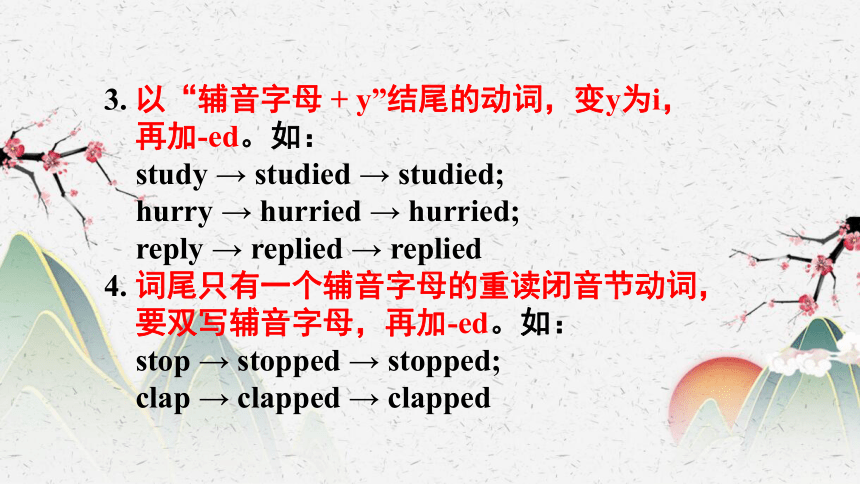
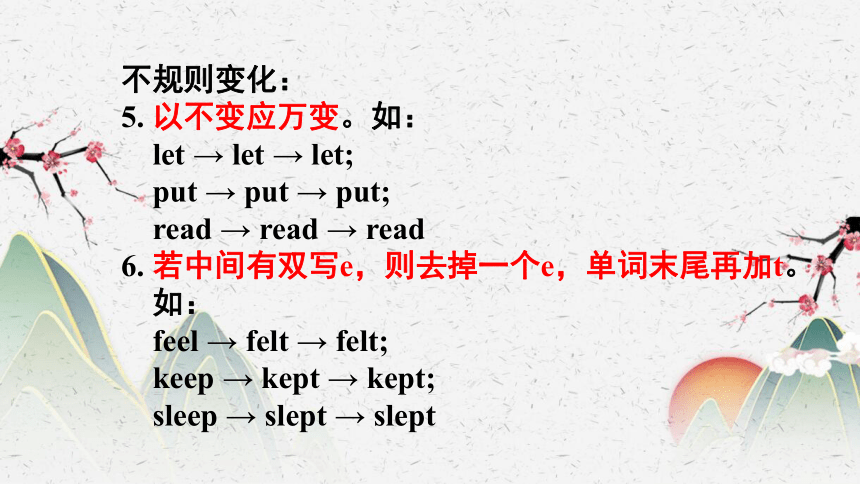
文档简介
(共22张PPT)
现在完成时复习课件
Revision
Fill in the blanks according to the Chinese meaning.
1. — 你读过《小妇人》吗?— 我读过。/我没读过。
— _____ you _______ Little Women yet
— Yes, I ______. / No, I ________.
Have
2. —Tina 读过《金银岛》吗?
— 她读了。她认为它棒极了。
— ______ Tina ______ Treasure Island yet
— Yes, _____ _____. She thinks it’s ________.
Has read
she has
read
have
haven’t
fantastic
3. — 你已经决定写哪本书了吗?
— 我已经决定了。我已经读完了它。它真的很棒。
— _____ you _______ which book ____ _____
_______ yet
— Yes, I have. I’ve _______ ________ reading it. It
was really good.
Have
decided
to write
already finished
about
用法:
1.表示过去发生或已经完成的某一动作对现在造
成的影响或结果。
e.g. –Have you had your lunch yet
–Yes, I have. I’ve just had it. (现在我不饿了。)
2.表示动作或状态从过去某一时刻开始,一直延
续到现在,而且可能还要继续下去。
现在完成时
e.g. I haven’t seen her these days.
I’ve known Bob for three years.
I’ve been at this school for over two years.
时间状语:
already, yet, just, ever, never, before
构成:
现在完成时是由“助动词have / has+ 动词的过
去分词”构成的,规则动词的过去分词构成与
过去式相同,不规则动词的过去分词则需逐个
记忆。动词的过去式的变化和过去分词的变化
并不完全相同。我们对它们作了一个大致的分
类。
一、过去式和过去分词的变化相同
规则变化:
1. 一般在动词词尾直接加ed。如:
pick → picked → picked;
wish → wished → wished;
stay → stayed → stayed
2. 以不发音的e结尾的动词后面加d。如:
like → liked → liked;
hope → hoped → hoped;
phone → phoned → phoned
3. 以“辅音字母 + y”结尾的动词,变y为i,
再加-ed。如:
study → studied → studied;
hurry → hurried → hurried;
reply → replied → replied
4. 词尾只有一个辅音字母的重读闭音节动词,
要双写辅音字母,再加-ed。如:
stop → stopped → stopped;
clap → clapped → clapped
不规则变化:
5. 以不变应万变。如:
let → let → let;
put → put → put;
read → read → read
6. 若中间有双写e,则去掉一个e,单词末尾再加t。如:
feel → felt → felt;
keep → kept → kept;
sleep → slept → slept
7. 末尾的字母d变t。如:
lend → lent → lent;
build → built → built;
send → sent → sent
8. 变为以-ought或-aught结尾。如:
buy → bought → bought;
bring → brought → brought;
catch → caught → caught;
teach → taught → taught
句式
1. 肯定句:主语 + have / has + 过去分词 (+ 其他)
2. 否定句:主语 + have / has + not + 过去分词(+ 其他)
3. 一般疑问句:have/ has + 主语 + 过去分词(+ 其他)
4. 特殊疑问句:
特殊疑问词 (不是句子主语) + have / has + 主语+过去分
词 (+ 其他)
2) 特殊疑问词(是句子主语)+have / has+ 过去分词(+ 其他)
already 意为“已经”,常用于肯定句中。一般置于助动词have/has之后,过去分词之前,但也可放在句末。
e.g. 我已经看过这部电影了。
I have already seen the film.
我已经解决了这个问题。
I have already solved this problem.
我已经做完家庭作业了。
I have finished my homework already.
现在完成时--与already连用
yet,在现在完成时句型中常置于句末。
1) “已经”,常用在疑问句中。
e.g. 琳达已看过这本书了吗
Has Linda read the book yet
你完成家庭作业了吗?
Have you finished your homework yet
2) “还,仍然”,常用于否定句和疑问句。
e.g. 他还未开始工作。
He has not begun to work yet.
现在完成时--与yet连用
just 意为“刚刚”,常用于肯定句中。一般置于助动词have/has之后,过去分词之前。
e.g. 我刚吃过午饭。
I have just finished lunch.
我们刚刚听说她的婚讯。
We have just heard of her marriage.
现在完成时--与just连用
同学们要注意现在完成时与一般过去时的区别。虽然这两个时态都和过去发生的事情有关,但是现在完成时强调这一动作与现在的关系,如对现在产生的结果、影响等,而一般过去时只表示过去的事实,不表示和现在的关系。如:
现在完成时与一般过去时
I went home at 10:00 yesterday. I have got home now.
我昨天十点回家的。现在我已经到家了。
I have already finished my homework.
我已经写完家庭作业了。
I finished my homework an hour ago.
我一个小时之前写完了家庭作业。
活学活用
一. Write the forms of the past tense and past participle:
drink ______ ______
see ______ ______
find ______ ______
leave ______ ______
tell ______ ______
drank drunk
saw seen
found found
left left
told told
二. Choose the right answer.
—Why is Mr. Yang still in the teachers’
office
—Maybe he ________ his work yet.
A. doesn’t finish
B. hasn’t finished
C. haven’t finished
B
三、用括号内所给单词的适当形式填空。
1. This novel is very interesting. My brother _________
(read) it three times.
2. Yesterday Mom _____ (give) me some money to buy
a dictionary.
3. Our school life ___________ (change) a lot since 2017.
We have more activities now.
4. He sent me a few messages, but I ______________
(not reply) yet as I don’t know what to say.
has read
gave
has changed
haven’t replied
1. —Have you seen the hot film Wandering Earth _____
—Yes, I have. _________ wonderful science fiction
movie it is!
A. yet; How a B. already; How
C. yet; What a D. already; What
2. —The book is popular. _____ you _____ it yet
—Yes, I have.
A. Are; reading B. Were; reading
C. Have; read D. Will; read
四、单项选择。
4. We _________ each other since I came to Beijing,
but we send emails very often.
A. don’t see B. didn’t see
C. won’t see D. haven’t seen
3. —When will you give the novel back to me
—Sorry, I ________ it. How about Friday
A. didn’t finish B. won’t finish
C. haven’t finished D. don’t finish
五、句型转换。
1. He has already had breakfast. (改为否定句)
He ______ ____ breakfast ___.
2. I have done my homework already. (改为一般疑问句)
_____ _____ done your homework ____
3. The old man has lived here for forty years.(对画线部
分提问)
____ _____ ____ the old man _____ here
hasn’t had yet
Have you
How long has
lived
yet
现在完成时复习课件
Revision
Fill in the blanks according to the Chinese meaning.
1. — 你读过《小妇人》吗?— 我读过。/我没读过。
— _____ you _______ Little Women yet
— Yes, I ______. / No, I ________.
Have
2. —Tina 读过《金银岛》吗?
— 她读了。她认为它棒极了。
— ______ Tina ______ Treasure Island yet
— Yes, _____ _____. She thinks it’s ________.
Has read
she has
read
have
haven’t
fantastic
3. — 你已经决定写哪本书了吗?
— 我已经决定了。我已经读完了它。它真的很棒。
— _____ you _______ which book ____ _____
_______ yet
— Yes, I have. I’ve _______ ________ reading it. It
was really good.
Have
decided
to write
already finished
about
用法:
1.表示过去发生或已经完成的某一动作对现在造
成的影响或结果。
e.g. –Have you had your lunch yet
–Yes, I have. I’ve just had it. (现在我不饿了。)
2.表示动作或状态从过去某一时刻开始,一直延
续到现在,而且可能还要继续下去。
现在完成时
e.g. I haven’t seen her these days.
I’ve known Bob for three years.
I’ve been at this school for over two years.
时间状语:
already, yet, just, ever, never, before
构成:
现在完成时是由“助动词have / has+ 动词的过
去分词”构成的,规则动词的过去分词构成与
过去式相同,不规则动词的过去分词则需逐个
记忆。动词的过去式的变化和过去分词的变化
并不完全相同。我们对它们作了一个大致的分
类。
一、过去式和过去分词的变化相同
规则变化:
1. 一般在动词词尾直接加ed。如:
pick → picked → picked;
wish → wished → wished;
stay → stayed → stayed
2. 以不发音的e结尾的动词后面加d。如:
like → liked → liked;
hope → hoped → hoped;
phone → phoned → phoned
3. 以“辅音字母 + y”结尾的动词,变y为i,
再加-ed。如:
study → studied → studied;
hurry → hurried → hurried;
reply → replied → replied
4. 词尾只有一个辅音字母的重读闭音节动词,
要双写辅音字母,再加-ed。如:
stop → stopped → stopped;
clap → clapped → clapped
不规则变化:
5. 以不变应万变。如:
let → let → let;
put → put → put;
read → read → read
6. 若中间有双写e,则去掉一个e,单词末尾再加t。如:
feel → felt → felt;
keep → kept → kept;
sleep → slept → slept
7. 末尾的字母d变t。如:
lend → lent → lent;
build → built → built;
send → sent → sent
8. 变为以-ought或-aught结尾。如:
buy → bought → bought;
bring → brought → brought;
catch → caught → caught;
teach → taught → taught
句式
1. 肯定句:主语 + have / has + 过去分词 (+ 其他)
2. 否定句:主语 + have / has + not + 过去分词(+ 其他)
3. 一般疑问句:have/ has + 主语 + 过去分词(+ 其他)
4. 特殊疑问句:
特殊疑问词 (不是句子主语) + have / has + 主语+过去分
词 (+ 其他)
2) 特殊疑问词(是句子主语)+have / has+ 过去分词(+ 其他)
already 意为“已经”,常用于肯定句中。一般置于助动词have/has之后,过去分词之前,但也可放在句末。
e.g. 我已经看过这部电影了。
I have already seen the film.
我已经解决了这个问题。
I have already solved this problem.
我已经做完家庭作业了。
I have finished my homework already.
现在完成时--与already连用
yet,在现在完成时句型中常置于句末。
1) “已经”,常用在疑问句中。
e.g. 琳达已看过这本书了吗
Has Linda read the book yet
你完成家庭作业了吗?
Have you finished your homework yet
2) “还,仍然”,常用于否定句和疑问句。
e.g. 他还未开始工作。
He has not begun to work yet.
现在完成时--与yet连用
just 意为“刚刚”,常用于肯定句中。一般置于助动词have/has之后,过去分词之前。
e.g. 我刚吃过午饭。
I have just finished lunch.
我们刚刚听说她的婚讯。
We have just heard of her marriage.
现在完成时--与just连用
同学们要注意现在完成时与一般过去时的区别。虽然这两个时态都和过去发生的事情有关,但是现在完成时强调这一动作与现在的关系,如对现在产生的结果、影响等,而一般过去时只表示过去的事实,不表示和现在的关系。如:
现在完成时与一般过去时
I went home at 10:00 yesterday. I have got home now.
我昨天十点回家的。现在我已经到家了。
I have already finished my homework.
我已经写完家庭作业了。
I finished my homework an hour ago.
我一个小时之前写完了家庭作业。
活学活用
一. Write the forms of the past tense and past participle:
drink ______ ______
see ______ ______
find ______ ______
leave ______ ______
tell ______ ______
drank drunk
saw seen
found found
left left
told told
二. Choose the right answer.
—Why is Mr. Yang still in the teachers’
office
—Maybe he ________ his work yet.
A. doesn’t finish
B. hasn’t finished
C. haven’t finished
B
三、用括号内所给单词的适当形式填空。
1. This novel is very interesting. My brother _________
(read) it three times.
2. Yesterday Mom _____ (give) me some money to buy
a dictionary.
3. Our school life ___________ (change) a lot since 2017.
We have more activities now.
4. He sent me a few messages, but I ______________
(not reply) yet as I don’t know what to say.
has read
gave
has changed
haven’t replied
1. —Have you seen the hot film Wandering Earth _____
—Yes, I have. _________ wonderful science fiction
movie it is!
A. yet; How a B. already; How
C. yet; What a D. already; What
2. —The book is popular. _____ you _____ it yet
—Yes, I have.
A. Are; reading B. Were; reading
C. Have; read D. Will; read
四、单项选择。
4. We _________ each other since I came to Beijing,
but we send emails very often.
A. don’t see B. didn’t see
C. won’t see D. haven’t seen
3. —When will you give the novel back to me
—Sorry, I ________ it. How about Friday
A. didn’t finish B. won’t finish
C. haven’t finished D. don’t finish
五、句型转换。
1. He has already had breakfast. (改为否定句)
He ______ ____ breakfast ___.
2. I have done my homework already. (改为一般疑问句)
_____ _____ done your homework ____
3. The old man has lived here for forty years.(对画线部
分提问)
____ _____ ____ the old man _____ here
hasn’t had yet
Have you
How long has
lived
yet
同课章节目录
- Unit 1 What's the matter?
- Section A
- Section B
- Unit 2 I'll help to clean up the city parks.
- Section A
- Section B
- Unit 3 Could you please clean your room?
- Section A
- Section B
- Unit 4 Why don't you talk to your parents?
- Section A
- Section B
- Unit 5 What were you doing when the rainstorm came
- Section A
- Section B
- Review of Units 1-5
- Unit 6 An old man tried to move the mountains.
- Section A
- Section B
- Unit 7 What's the highest mountain in the world?
- Section A
- Section B
- Unit 8 Have you read Treasure Island yet?
- Section A
- Section B
- Unit 9 Have you ever been to a museum?
- Section A
- Section B
- Unit 10 I've had this bike for three years.
- Section A
- Section B
